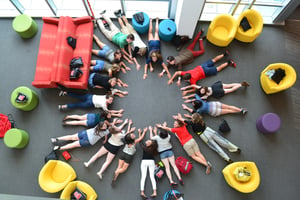Congratulations! You’ve been accepted to college! All those long years of hard work have paid off. Now you can kick back, put your feet up and chill until the first day of your freshman year, right? WRONG!
There’s a lot to do between now and that first day of school and while your parents may have taken care of all the little details in the past, now it’s time for you to step up and take responsibility! We know this may be new for you and your parents, so here are a few tips to help you both make a smooth transition.
1. Confirm your enrollment and send in your deposit!
Yes, the letter said you got in, but there’s a lot more important information in that packet. Take some time and review it, as well as deadlines for requested information. In addition, check your e-mail often for any updates.
2. Check out your school’s website.
Just about every school has a “New Student” section. Read it now. There may be early deadlines for medical forms, registration for orientation, residence hall selection, and online awareness education programs, just to name a few. Don’t wait until the week before school begins to go through the list.
“In May, after all new students have made their deposits, they are given access to websites to help them learn about registration, complete their housing form, submit health forms, and learn about other helpful guides to promote their success,” said Jeff Rickey, Vice President and Dean of Admissions & Financial Aid for St. Lawrence University.
Michael Coombes, director of North Carolina State University’s New Student Program, encourages parents and students to visit their school’s website often and double check the New Student Check List. “The list is a roadmap of what to do between the time of when they get accepted and before they start classes. Take care of things early. The less you have to do in August, the better.”
3. Schedule your orientation session now. 
The earlier you do it, the better. Don’t forget to book hotel rooms too. Depending on where you go to school, there may not be a lot of options for lodging. In addition, if your parents plan to bring you to school for move-in day and they need to stay overnight, make those reservations now too.
Parents are encouraged to attend orientation. It’s a great way to support students with their transition to school. “Orientation can give parents a basic knowledge of what their student is going to experience,” said Coombes. “It helps parents understand the environment, as well as the different resources available to the students.”
4. Get Connected!
It can all start with #. Take some time to get connected to your new school. There are so many options and social media is a great place to begin. “After students are admitted they are encouraged to join their class social media presence on Facebook, Twitter, and Instagram,” said Rickey.
In addition, different groups for your major, your residence hall, or clubs, etc., may have their own social media presence. At NC State, #NCState19 is used for new students to find each other, learn about different events, and follow relevant information. When students come to orientation or the start of the semester, they already have a certain comfort level because #NCState19 started the conversation.
“Often, it’s the students who create these connections on their own,” said Coombes. “It stems from what students want. They are forming smaller connections. It makes the students feel they are a part of the community, a part of their new home.”
5. Sign up for housing.
Residence halls fill up fast. Make sure you get your assignment as soon as possible. Social media is a great way to learn about different housing options, get insight from upperclassmen, and even research creative decorating ideas. Check out YouTube for virtual tours! It’s also a great way to find or get to know your future roommate! Once you have your roommate assignment, Rickey recommends making contact as soon as possible.
6. Look for First Year Send-Off parties.
Many universities have alumni chapters or parent association groups that host get-togethers in local cities for new students to meet each other, as well as meet returning students or alumni. It’s a great way for parents to connect as well. “This bridges the connection to their new school and makes them feel they are part of the community,” said Coombes. “It gets them excited about what they are doing.”
7. Keep your brain active.
“After high school graduation, students should read,” said Rickey. “Reading promotes better reading - a skill that is paramount in college – and promotes better writing, too, another vital skill.”
Many universities now have a common reading program. A book is chosen for everyone to read over the summer. “It connects the students to the intellectual environment,” said Coombes. “When they come to campus, they can hear the author of the book speak. They participate in programs and discussions. Students can have conversations and think critically about themes in the book. We have one common experience. It keeps their mind fresh.”
Coombes also suggests that students familiarize themselves with the university’s academic resources before they get to school. “If students know they are there, they are more apt to use them.”
8. Think about how you want to engage in your campus when you get there.
“Engagement is vital to their success,” said Coombes. “Take a look at your university and what you want out of it. Think about ways to engage in your new community, whether it’s in a sorority or fraternity, a club, studying abroad, or service learning. Ask yourself who you are going to be and how are you going to act. Think critically about your behavior.”
“College is an opportunity for a student to reinvent herself or himself,” said Rickey. “If a student has a bad habit, she or he wants to break, then now is the time. One way to ease the college transition is to be open-minded and to be interested in everyone and everything. Just about everyone is looking for new friends!”
9. Look for opportunities to be independent.
Get a part time job for the summer or look for opportunities to volunteer in your community. If you don’t have one already, set up a checking account and talk to your parents about financial responsibility and spending behavior, as well as how to use a debit card or credit card wisely. Do your own laundry!
“Students who have not experienced some independence before coming to college sometimes have challenges dealing with the freedom and responsibility that comes with attending college,” said Rickey. “Parents would do well to promote or create opportunities for their high schoolers to exercise some independence and have them learn the joys, challenges, and lessons that stem from doing things themselves.”
10. Attend Welcome Week.
Look for events that might help you adapt to your new environment and meet other new students. Welcome Week is geared for new students and usually takes place the week before classes begin. NC State also has a Summer Start program, a Symposium, and an Outward Bound trip. “It’s a great way to connect to the institution and build a small community within a huge campus,” said Coombes.
11. Don’t wait to pack!
You would be surprised (or maybe you wouldn’t!) at how many students wait until the night before to pack. Think about what you need for the semester. Keep a running list over the summer and start putting things aside. Give yourself time to go through everything again before you leave.
12. Go for a walk.
During Orientation, Welcome Week, and before your first day of classes, walk the campus. Go to each classroom and see how long it takes to get from class to class. Become familiar with your surroundings. Coombes said many students admit they wished they had looked at a map of the campus and walked it before classes began.
13. Don’t do anything you’ll regret.
Every university has a code of conduct and your admission is not guaranteed. “We expect students to continue performing at the level at which they were admitted,” said Rickey. “We have rescinded our offer of admission when the student has underperformed. We have also rescinded admission for criminal offenses that occurred after our offer of admission.”
14. Have some conversations.
Don’t wait till the week before drop-off to talk with your parents. Have conversations throughout the summer about expectations about grades, finances, privacy, communication, behavior, etc. Also talk about whether parents will have access to grades and financial information.
15. Have fun!
Make time to get together with family and friends this summer. Celebrate your accomplishments and share the excitement of your future at college!
Photo credits: Tara Freeman, St. Lawrence University, and Blaise Bolemon, New Student Programs, NC State University.


 add in traffic, minimal parking, August weather, and if you’re lucky two elevators – that is college move-in day! Don’t worry. In the right frame of mind and a little preparation, you’ll get through it just fine. Here are few tips from Residence Hall experts and parents that have survived the freshmen day move in!
add in traffic, minimal parking, August weather, and if you’re lucky two elevators – that is college move-in day! Don’t worry. In the right frame of mind and a little preparation, you’ll get through it just fine. Here are few tips from Residence Hall experts and parents that have survived the freshmen day move in!
 “I did it and had a good cry on the way home. My kids said I took it well and they weren’t worried about me! It made them feel better about moving on.”
“I did it and had a good cry on the way home. My kids said I took it well and they weren’t worried about me! It made them feel better about moving on.”





